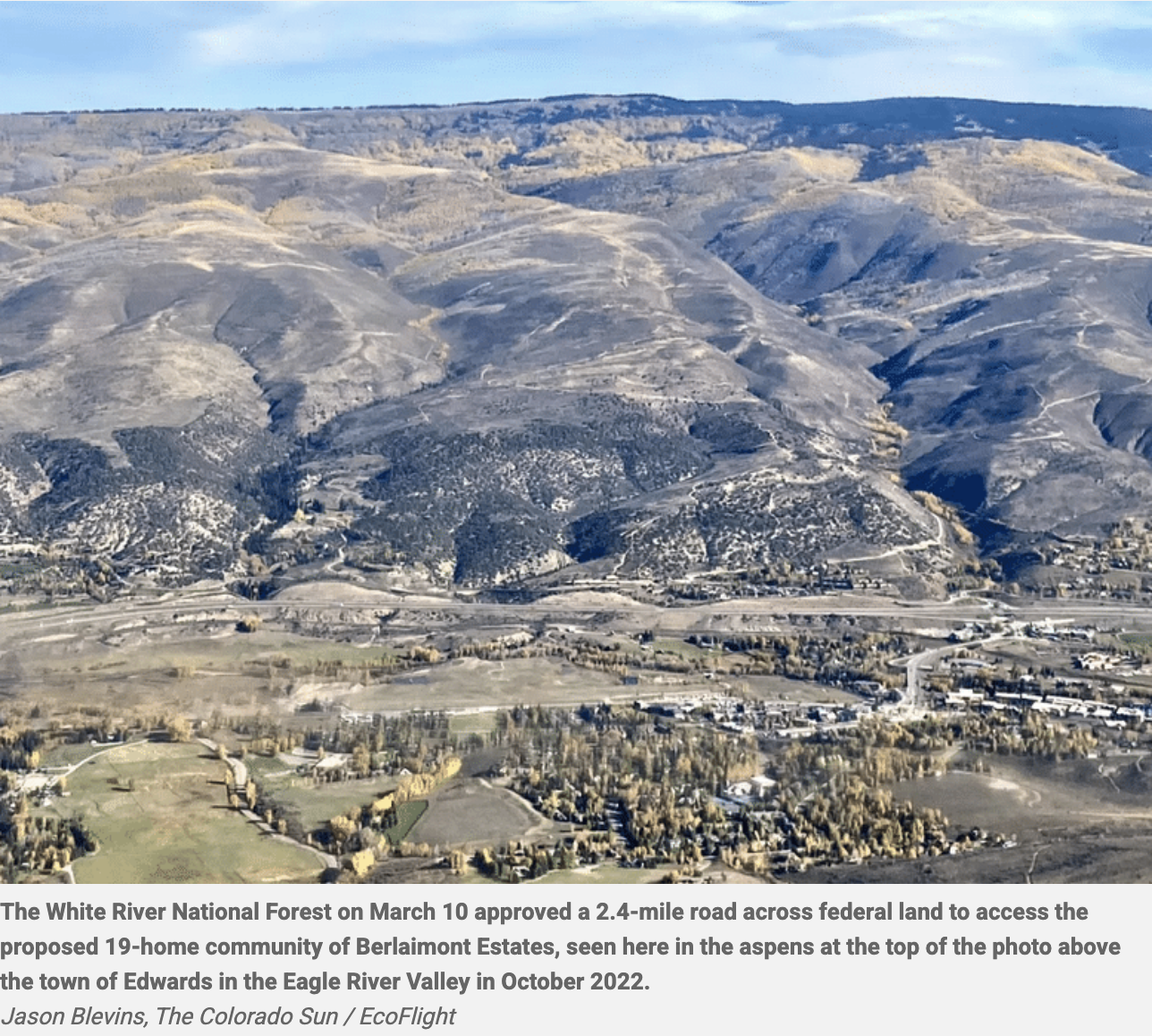
A leading opponent of the Berlaimont Estates project near Edwards wasted little time before mounting a legal challenge to a March 10 U.S. Forest Service decision
approving an all-season road to the site.
The Wilderness Workshop, based in Carbondale, filed suit this past week in U.S. District Court in Washington D.C. to stop the road approval.
The 69-page complaint names a number of federal officials, including White River National Forest Supervisor Scott Fitzwilliams.
The complaint seeks a determination that the decision violated the Federal Land and Policy Management Act of 1976. The decision instead relied on the provisions of the Alaska National Interest Lands Conservation Act of 1980.
The complaint also alleges that USFS “relied on erroneous interpretations of federal law.”
The complaint also seeks recovery of legal and other costs of litigation.
Wilderness Workshop legal director Peter Hart in a telephone interview said the Alaska National Interest Lands Conservation Act should properly apply only to Alaska, not the country at large.
“Legislation applies to specific places all the time,” he said, citing laws that create national monuments and wildlife areas as an example.
The Wilderness Workshop maintains that there’s already access to the Berlaimont property, a seasonal road.
That road “was adequate,” complete with seasonal closures when the current owners purchased the property, Wilderness Workshop contends.
While the road isn’t open in the winter, there is year-round access, Hart said. That access could come via snowmobile or similar vehicles. That’s the only winter access to the old mining town of Fulford, outside of Eagle, he noted.
Resolving the complaint could take some time.
He said USFS has 60 days to answer the complaint. That would be followed by a response from the plaintiff. Briefings and hearings are then set.
Even if the March 10 decision stands, the Berlaimont project still has a number of local hurdles to clear before anything is built.
Following a draft decision in September 2020 approving the paved road, the Eagle County Board of Commissioners in November 2020 wrote a letter to USFS regarding the decision.
The letter notes a 2014 conditional county approval of a variance from improvement standards regarding access to the Berlaimont property.
The letter notes that the conditional approval applied only to the technical aspects of the request, and that the commissioners “did not have the authority to consider the social and environmental impacts” of the new road.
The complaint also seeks recovery of legal and other costs of litigation.
Wilderness Workshop legal director Peter Hart in a telephone interview said the Alaska National Interest Lands Conservation Act should properly apply only to Alaska, not the country at large.
“Legislation applies to specific places all the time,” he said, citing laws that create national monuments and wildlife areas as an example.
The Wilderness Workshop maintains that there’s already access to the Berlaimont property, a seasonal road.
That road “was adequate,” complete with seasonal closures when the current owners purchased the property, Wilderness Workshop contends.
While the road isn’t open in the winter, there is year-round access, Hart said. That access could come via snowmobile or similar vehicles. That’s the only winter access to the old mining town of Fulford, outside of Eagle, he noted.
Resolving the complaint could take some time.
He said USFS has 60 days to answer the complaint. That would be followed by a response from the plaintiff. Briefings and hearings are then set.
Even if the March 10 decision stands, the Berlaimont project still has a number of local hurdles to clear before anything is built.
Following a draft decision in September 2020 approving the paved road, the Eagle County Board of Commissioners in November 2020 wrote a letter to USFS regarding the decision.
The letter notes a 2014 conditional county approval of a variance from improvement standards regarding access to the Berlaimont property.
The letter notes that the conditional approval applied only to the technical aspects of the request, and that the commissioners “did not have the authority to consider the social and environmental impacts” of the new road.

The letter adds that the road and access variances “should not be interpreted as approval” of the development.
While state law exempts parcels of 35 acres or more from zoning approval, county regulations still apply regarding wildfire mitigation, visual impact mitigation, and building and fire code compliance.
The letter also noted that county approval is needed for water and septic systems.
While the letter professes neutrality regarding approval of the access road, “… we continue to have concerns regarding … the potential environmental and social impacts of a permanent road …”
The USFS decision approves the second of four alternatives for the road. But the 2020 county letter asks for further consideration of elements including the impacts on adjacent residential properties, impacts on recreational experiences, and impacts on local wildlife and habitat.
Both USFS and a representative of the Berlaimont developers sent “no comment” emails in response to the court filing.